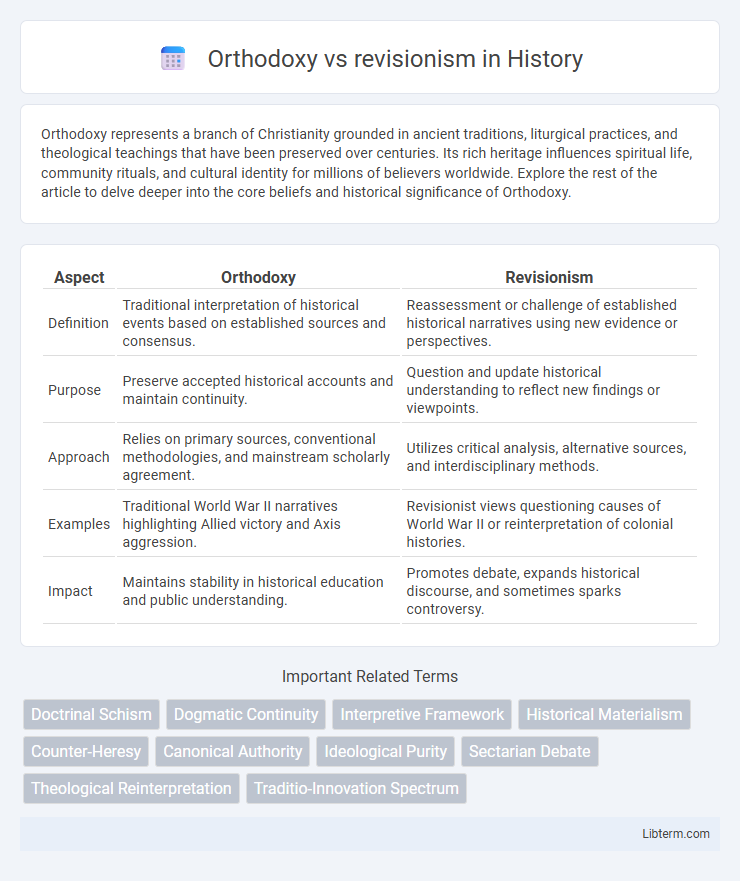Orthodoxy represents a branch of Christianity grounded in ancient traditions, liturgical practices, and theological teachings that have been preserved over centuries. Its rich heritage influences spiritual life, community rituals, and cultural identity for millions of believers worldwide. Explore the rest of the article to delve deeper into the core beliefs and historical significance of Orthodoxy.
Table of Comparison
| Aspect | Orthodoxy | Revisionism |
|---|---|---|
| Definition | Traditional interpretation of historical events based on established sources and consensus. | Reassessment or challenge of established historical narratives using new evidence or perspectives. |
| Purpose | Preserve accepted historical accounts and maintain continuity. | Question and update historical understanding to reflect new findings or viewpoints. |
| Approach | Relies on primary sources, conventional methodologies, and mainstream scholarly agreement. | Utilizes critical analysis, alternative sources, and interdisciplinary methods. |
| Examples | Traditional World War II narratives highlighting Allied victory and Axis aggression. | Revisionist views questioning causes of World War II or reinterpretation of colonial histories. |
| Impact | Maintains stability in historical education and public understanding. | Promotes debate, expands historical discourse, and sometimes sparks controversy. |
Defining Orthodoxy and Revisionism
Orthodoxy in religious or political contexts refers to the established, traditional beliefs and doctrines that are widely accepted by the majority or by authoritative institutions. Revisionism challenges these established views by proposing re-interpretations or modifications based on new evidence, perspectives, or critiques, often seeking to correct or update traditional narratives. Defining Orthodoxy emphasizes adherence to core, historically validated principles, while Revisionism prioritizes reform and critical re-examination to address perceived inaccuracies or outdated aspects.
Historical Roots of the Debate
The historical roots of the Orthodoxy versus revisionism debate trace back to differing interpretations of key political and social events during the mid-20th century, particularly regarding the causes and consequences of World War II and the Cold War. Traditional Orthodox historians emphasize the aggressive policies and expansionism of totalitarian regimes, especially Nazi Germany and the Soviet Union, as the primary catalysts of global conflict. Revisionist scholars challenge this view by highlighting the role of Western powers' economic interests and diplomatic failures, arguing that these factors significantly influenced the outbreak and escalation of tensions.
Key Theoretical Principles
Orthodoxy in economics emphasizes rational expectations, market efficiency, and equilibrium-driven models where agents optimize utility based on available information. Revisionism challenges these principles by incorporating behavioral insights, institutional influences, and non-equilibrium dynamics, arguing that markets often exhibit imperfections and agents act with bounded rationality. The key theoretical divergence lies in orthodoxy's reliance on mathematical formalism and general equilibrium, contrasted with revisionism's focus on empirical anomalies and adaptive economic behavior.
Major Figures and Thought Leaders
Major figures in Orthodoxy include Thomas Aquinas, whose Scholastic approach emphasized harmonizing faith and reason, and Augustine of Hippo, known for his influential doctrines on original sin and grace. In contrast, revisionism features thinkers like John Shelby Spong, who advocates for reinterpreting traditional Christian beliefs in light of modern knowledge and social progress, and Marcus Borg, who emphasizes a metaphorical understanding of scripture. These thought leaders shape their respective movements by challenging or reaffirming foundational theological principles.
Core Arguments of Orthodoxy
Orthodoxy emphasizes the preservation of established doctrines based on traditional interpretations of religious texts, prioritizing historical continuity and communal consensus. It argues that faith and practice must remain anchored in authoritative teachings passed down through generations to maintain theological integrity. This perspective views revisionism as a threat to the coherence and authenticity of core beliefs.
Core Arguments of Revisionism
Revisionism challenges the traditional historical interpretations of events by questioning established narratives and emphasizing overlooked or newly discovered evidence. Core arguments of revisionism often highlight biases and propaganda within orthodox accounts, arguing that mainstream history may suppress alternative perspectives or inconvenient truths. Revisionists prioritize re-examining sources critically and promoting a more nuanced understanding of historical complexities.
Case Studies in Practice
Case studies in orthodoxy versus revisionism reveal contrasting approaches to historical interpretation and theoretical frameworks. Orthodoxy emphasizes adherence to established narratives and methodologies, often prioritizing consensus and traditional evidence, while revisionism challenges these accounts by re-evaluating sources and proposing alternative perspectives. Practical examples include debates in political history, where orthodox views may emphasize state-centric explanations, and revisionist studies highlight marginalized voices or previously overlooked factors.
Impact on Contemporary Discourse
Orthodoxy shapes contemporary discourse by reinforcing traditional interpretations and preserving foundational principles within ideological and religious contexts. Revisionism challenges established narratives, prompting critical re-evaluation and fostering dynamic debate across academic, political, and cultural spheres. The interplay between orthodoxy and revisionism drives intellectual progress and influences policy-making by balancing continuity with innovation.
Critiques and Controversies
Orthodoxy in academic disciplines often faces critiques for rigid adherence to established doctrines that may stifle innovation and diverse perspectives. Revisionism challenges these traditional narratives by re-examining evidence and advocating alternative interpretations, but it encounters controversy for perceived historical revision that some view as undermining consensus or political agendas. Both approaches provoke intense debate over methodology, legitimacy of sources, and the impact on cultural or national identity.
Future Directions and Reconciliation
Future directions in the debate between Orthodoxy and Revisionism emphasize interdisciplinary research combining historical evidence with political analysis to foster a nuanced understanding of contentious events. Reconciliation efforts aim to bridge divides through dialogue and mutual recognition of biases, promoting collaborative scholarship and educational initiatives that encourage critical thinking and empathy. Integrating diverse perspectives and methodologies supports a more comprehensive historiography that moves beyond entrenched positions.
Orthodoxy Infographic

 libterm.com
libterm.com